Business Law HA2022 Group Assignment 2018: Contract and Torts
VerifiedAdded on 2023/06/07
|14
|947
|390
Homework Assignment
AI Summary
This document provides a comprehensive solution to a Business Law group assignment (HA2022). The assignment addresses two key legal issues: breach of contract and consumer guarantees under Australian Consumer Law (ACL). The first part examines a scenario where a partnership agreement is potentially breached, analyzing the elements required for a valid contract, including intention to create legal relations and the consequences of breaching contract terms. The second part focuses on a consumer's rights when purchasing goods with a defective title, specifically addressing the guarantees provided by the ACL, including the guarantee of title, and the remedies available to the consumer in case of a breach. The solution references relevant case law and legislation, providing a detailed analysis of each issue.
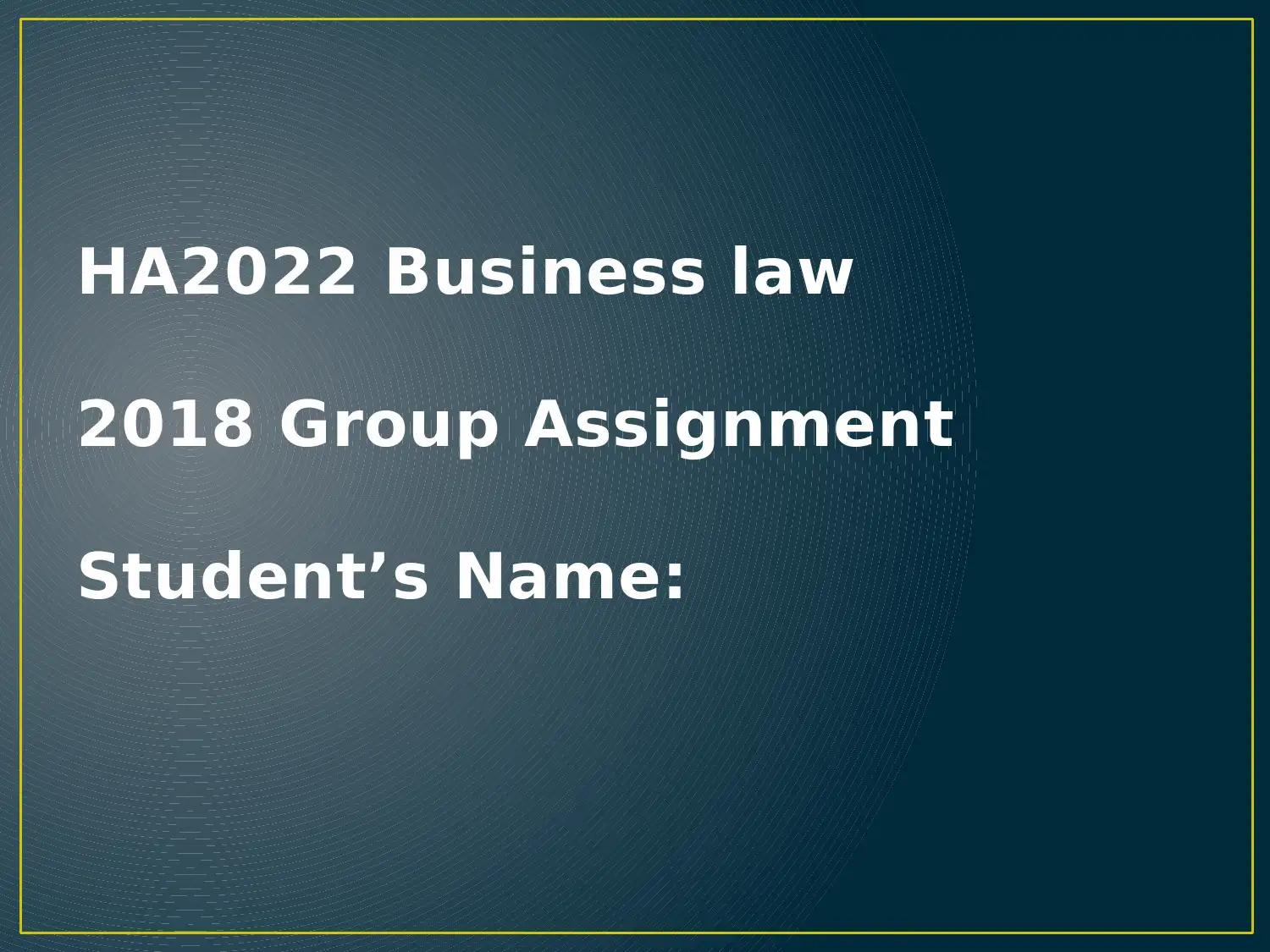
HA2022 Business law
2018 Group Assignment
Student’s Name:
2018 Group Assignment
Student’s Name:
Paraphrase This Document
Need a fresh take? Get an instant paraphrase of this document with our AI Paraphraser
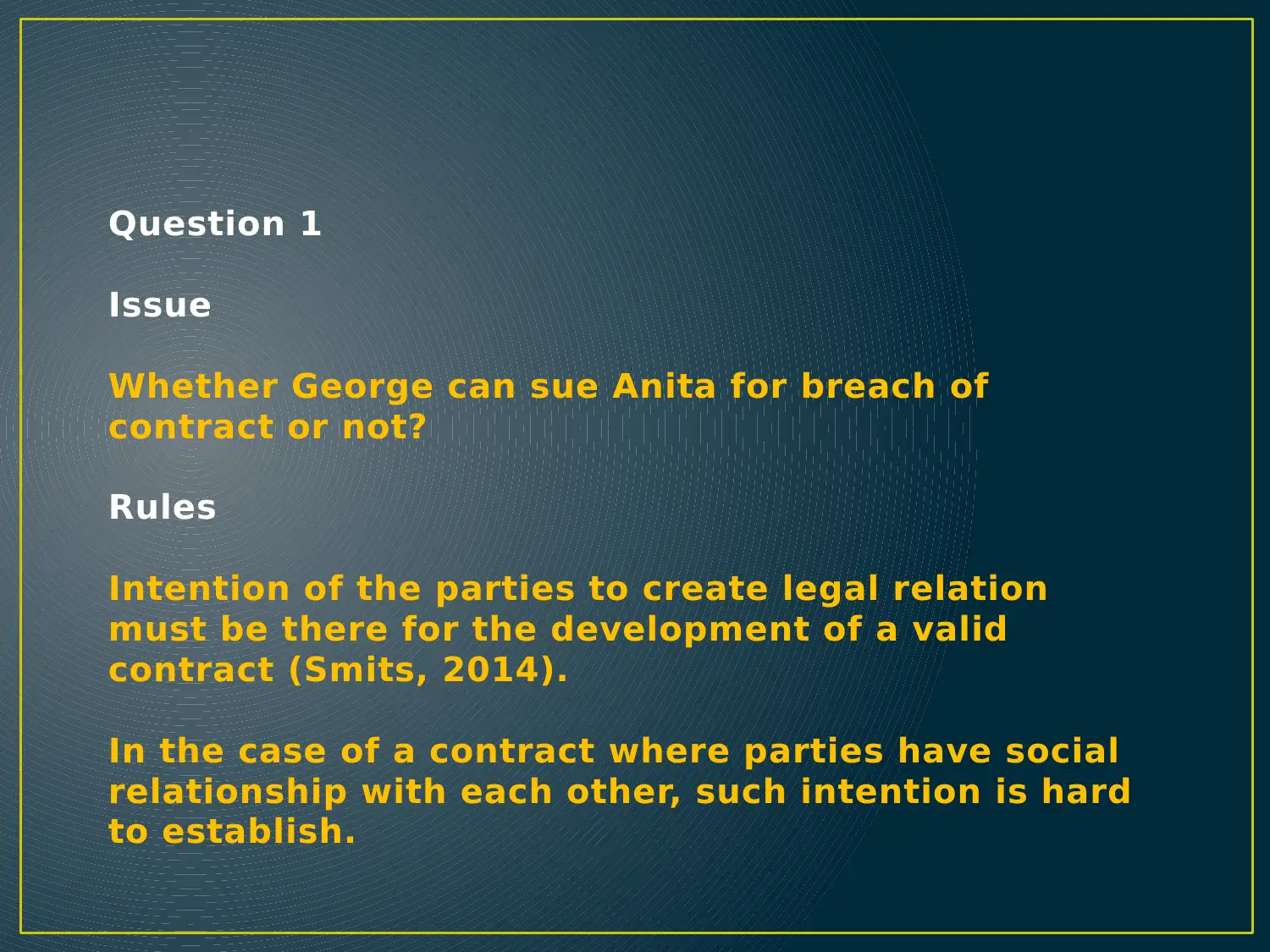
Question 1
Issue
Whether George can sue Anita for breach of
contract or not?
Rules
Intention of the parties to create legal relation
must be there for the development of a valid
contract (Smits, 2014).
In the case of a contract where parties have social
relationship with each other, such intention is hard
to establish.
Issue
Whether George can sue Anita for breach of
contract or not?
Rules
Intention of the parties to create legal relation
must be there for the development of a valid
contract (Smits, 2014).
In the case of a contract where parties have social
relationship with each other, such intention is hard
to establish.
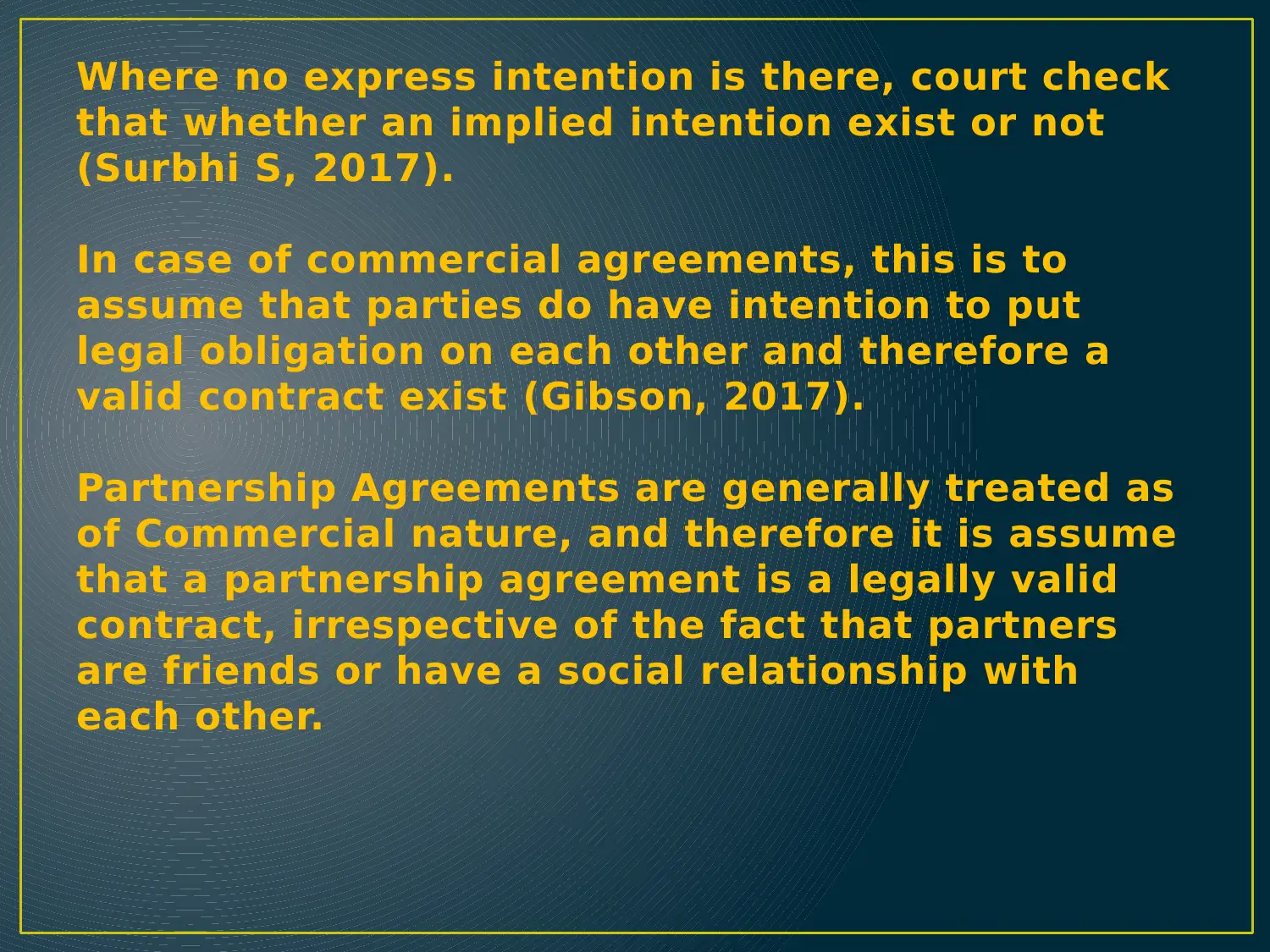
Where no express intention is there, court check
that whether an implied intention exist or not
(Surbhi S, 2017).
In case of commercial agreements, this is to
assume that parties do have intention to put
legal obligation on each other and therefore a
valid contract exist (Gibson, 2017).
Partnership Agreements are generally treated as
of Commercial nature, and therefore it is assume
that a partnership agreement is a legally valid
contract, irrespective of the fact that partners
are friends or have a social relationship with
each other.
that whether an implied intention exist or not
(Surbhi S, 2017).
In case of commercial agreements, this is to
assume that parties do have intention to put
legal obligation on each other and therefore a
valid contract exist (Gibson, 2017).
Partnership Agreements are generally treated as
of Commercial nature, and therefore it is assume
that a partnership agreement is a legally valid
contract, irrespective of the fact that partners
are friends or have a social relationship with
each other.
⊘ This is a preview!⊘
Do you want full access?
Subscribe today to unlock all pages.

Trusted by 1+ million students worldwide
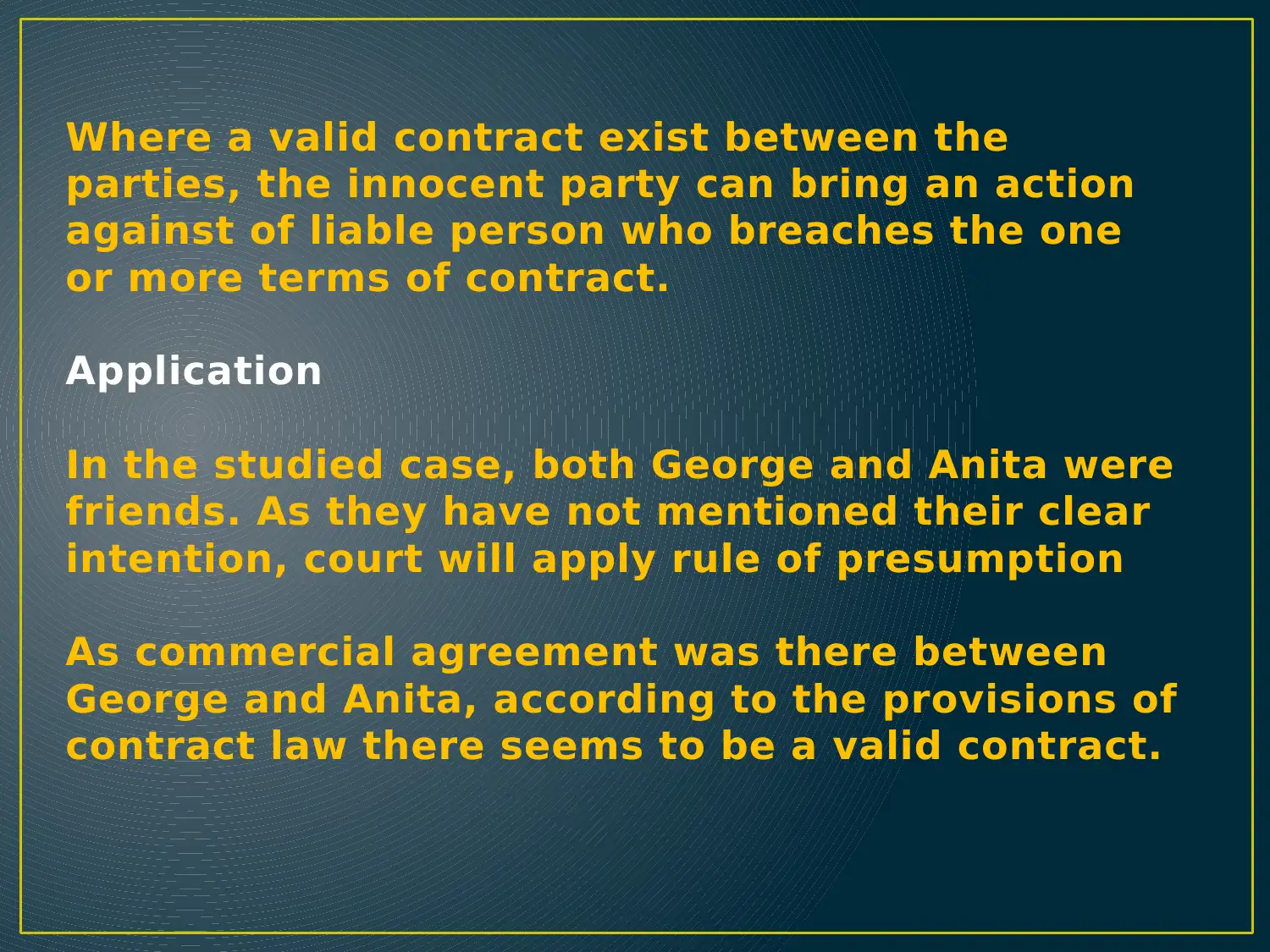
Where a valid contract exist between the
parties, the innocent party can bring an action
against of liable person who breaches the one
or more terms of contract.
Application
In the studied case, both George and Anita were
friends. As they have not mentioned their clear
intention, court will apply rule of presumption
As commercial agreement was there between
George and Anita, according to the provisions of
contract law there seems to be a valid contract.
parties, the innocent party can bring an action
against of liable person who breaches the one
or more terms of contract.
Application
In the studied case, both George and Anita were
friends. As they have not mentioned their clear
intention, court will apply rule of presumption
As commercial agreement was there between
George and Anita, according to the provisions of
contract law there seems to be a valid contract.
Paraphrase This Document
Need a fresh take? Get an instant paraphrase of this document with our AI Paraphraser
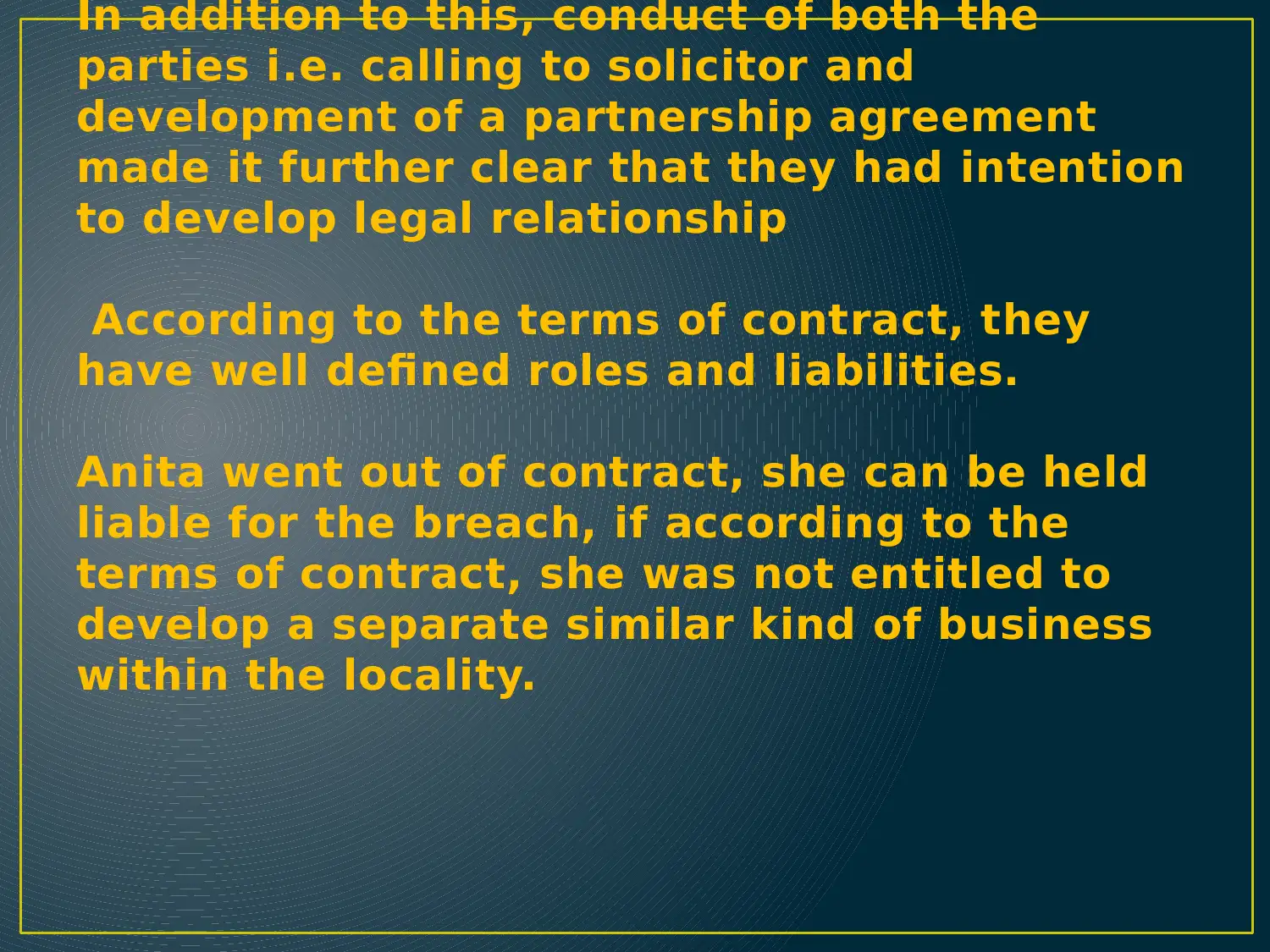
In addition to this, conduct of both the
parties i.e. calling to solicitor and
development of a partnership agreement
made it further clear that they had intention
to develop legal relationship
According to the terms of contract, they
have well defined roles and liabilities.
Anita went out of contract, she can be held
liable for the breach, if according to the
terms of contract, she was not entitled to
develop a separate similar kind of business
within the locality.
parties i.e. calling to solicitor and
development of a partnership agreement
made it further clear that they had intention
to develop legal relationship
According to the terms of contract, they
have well defined roles and liabilities.
Anita went out of contract, she can be held
liable for the breach, if according to the
terms of contract, she was not entitled to
develop a separate similar kind of business
within the locality.
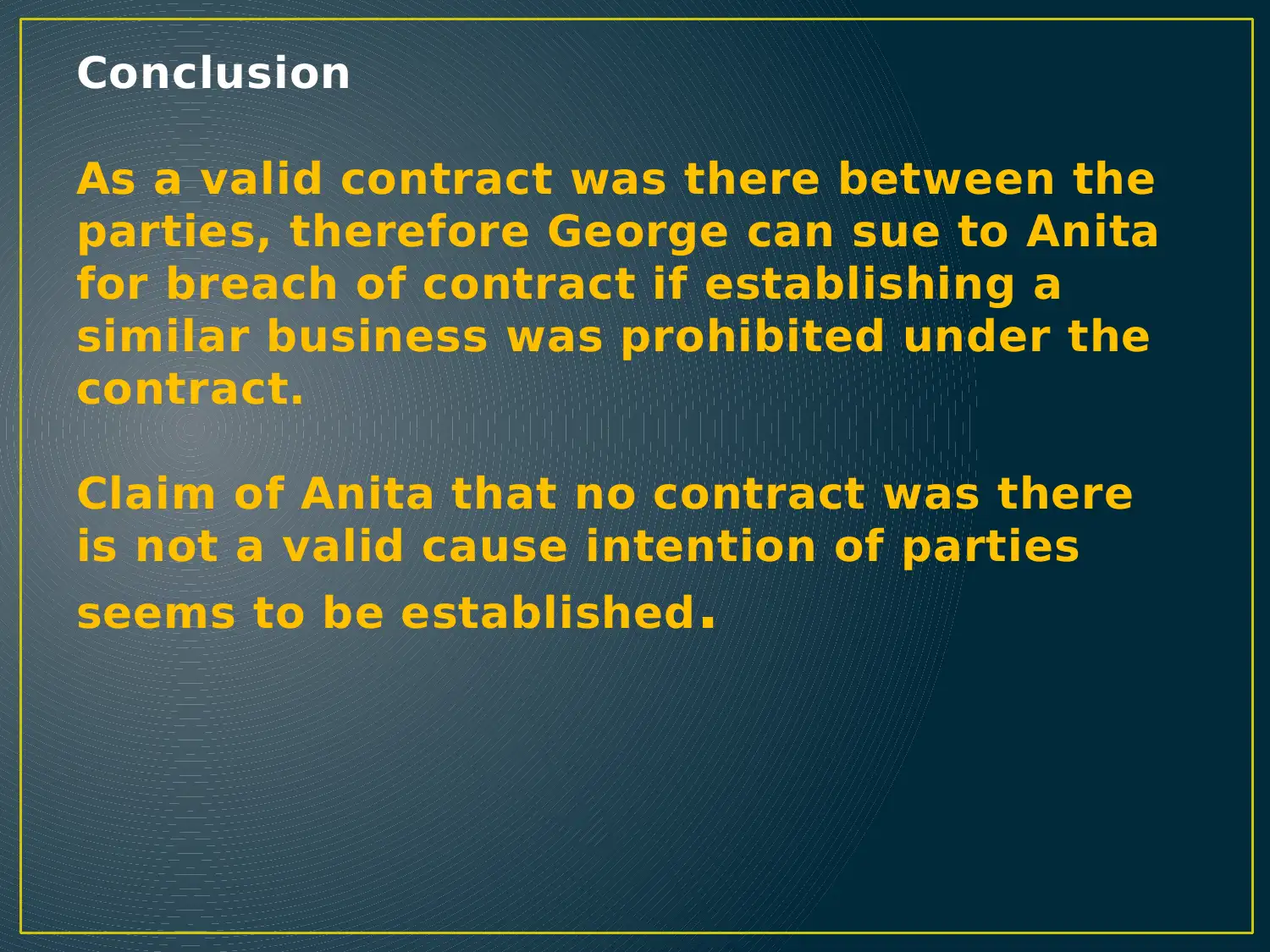
Conclusion
As a valid contract was there between the
parties, therefore George can sue to Anita
for breach of contract if establishing a
similar business was prohibited under the
contract.
Claim of Anita that no contract was there
is not a valid cause intention of parties
seems to be established.
As a valid contract was there between the
parties, therefore George can sue to Anita
for breach of contract if establishing a
similar business was prohibited under the
contract.
Claim of Anita that no contract was there
is not a valid cause intention of parties
seems to be established.
⊘ This is a preview!⊘
Do you want full access?
Subscribe today to unlock all pages.

Trusted by 1+ million students worldwide
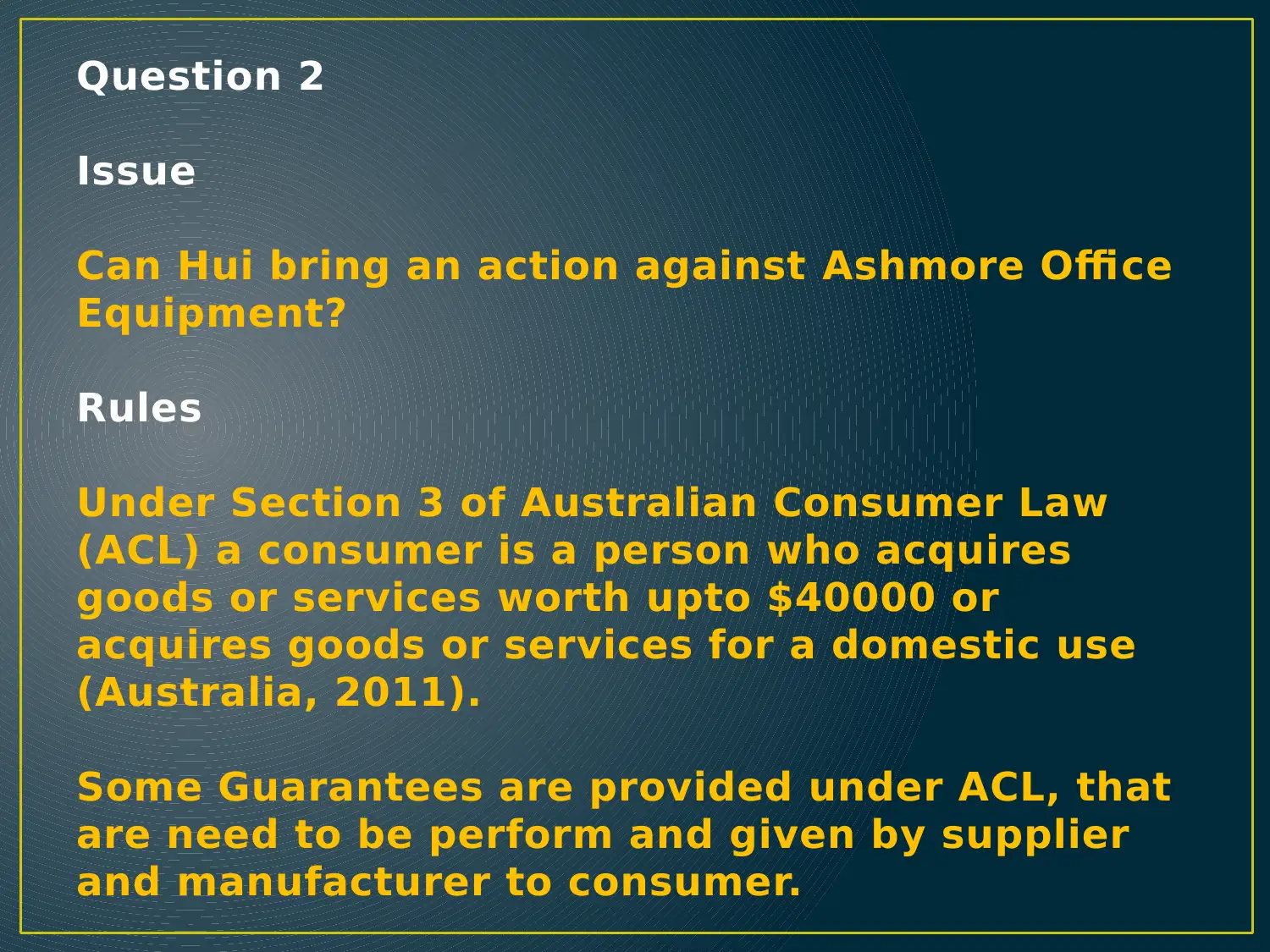
Question 2
Issue
Can Hui bring an action against Ashmore Office
Equipment?
Rules
Under Section 3 of Australian Consumer Law
(ACL) a consumer is a person who acquires
goods or services worth upto $40000 or
acquires goods or services for a domestic use
(Australia, 2011).
Some Guarantees are provided under ACL, that
are need to be perform and given by supplier
and manufacturer to consumer.
Issue
Can Hui bring an action against Ashmore Office
Equipment?
Rules
Under Section 3 of Australian Consumer Law
(ACL) a consumer is a person who acquires
goods or services worth upto $40000 or
acquires goods or services for a domestic use
(Australia, 2011).
Some Guarantees are provided under ACL, that
are need to be perform and given by supplier
and manufacturer to consumer.
Paraphrase This Document
Need a fresh take? Get an instant paraphrase of this document with our AI Paraphraser
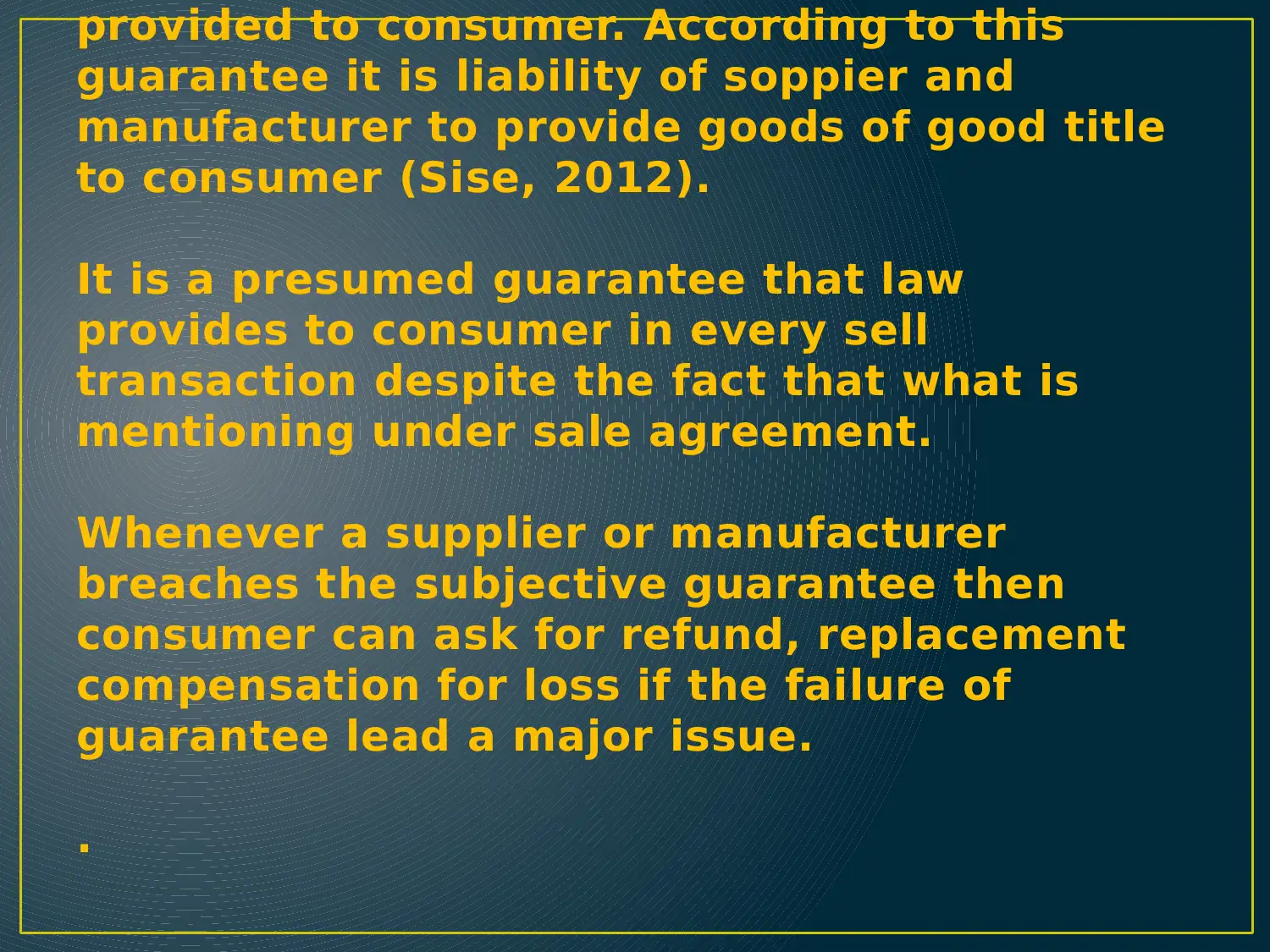
provided to consumer. According to this
guarantee it is liability of soppier and
manufacturer to provide goods of good title
to consumer (Sise, 2012).
It is a presumed guarantee that law
provides to consumer in every sell
transaction despite the fact that what is
mentioning under sale agreement.
Whenever a supplier or manufacturer
breaches the subjective guarantee then
consumer can ask for refund, replacement
compensation for loss if the failure of
guarantee lead a major issue.
.
guarantee it is liability of soppier and
manufacturer to provide goods of good title
to consumer (Sise, 2012).
It is a presumed guarantee that law
provides to consumer in every sell
transaction despite the fact that what is
mentioning under sale agreement.
Whenever a supplier or manufacturer
breaches the subjective guarantee then
consumer can ask for refund, replacement
compensation for loss if the failure of
guarantee lead a major issue.
.
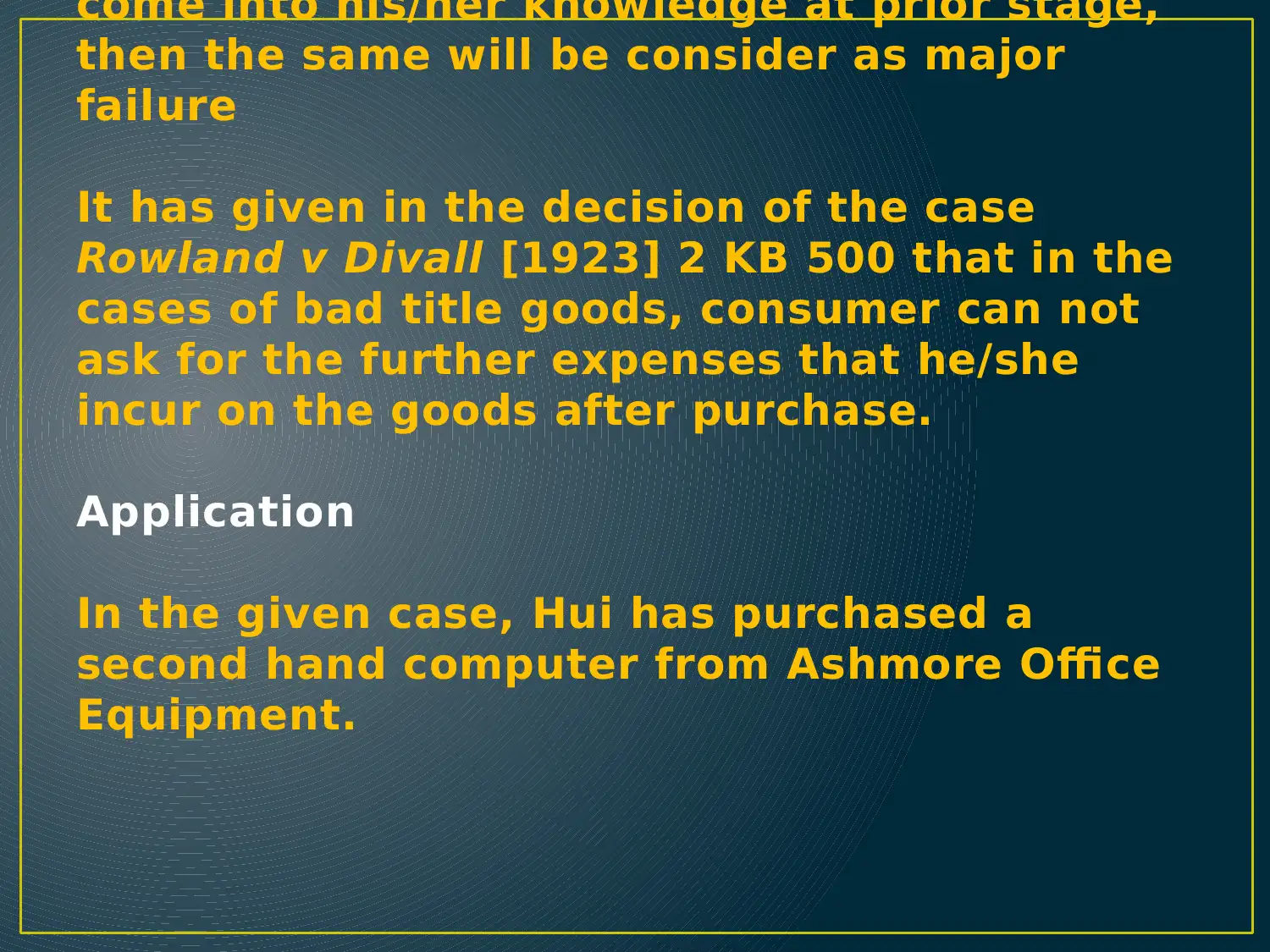
come into his/her knowledge at prior stage,
then the same will be consider as major
failure
It has given in the decision of the case
Rowland v Divall [1923] 2 KB 500 that in the
cases of bad title goods, consumer can not
ask for the further expenses that he/she
incur on the goods after purchase.
Application
In the given case, Hui has purchased a
second hand computer from Ashmore Office
Equipment.
then the same will be consider as major
failure
It has given in the decision of the case
Rowland v Divall [1923] 2 KB 500 that in the
cases of bad title goods, consumer can not
ask for the further expenses that he/she
incur on the goods after purchase.
Application
In the given case, Hui has purchased a
second hand computer from Ashmore Office
Equipment.
⊘ This is a preview!⊘
Do you want full access?
Subscribe today to unlock all pages.

Trusted by 1+ million students worldwide
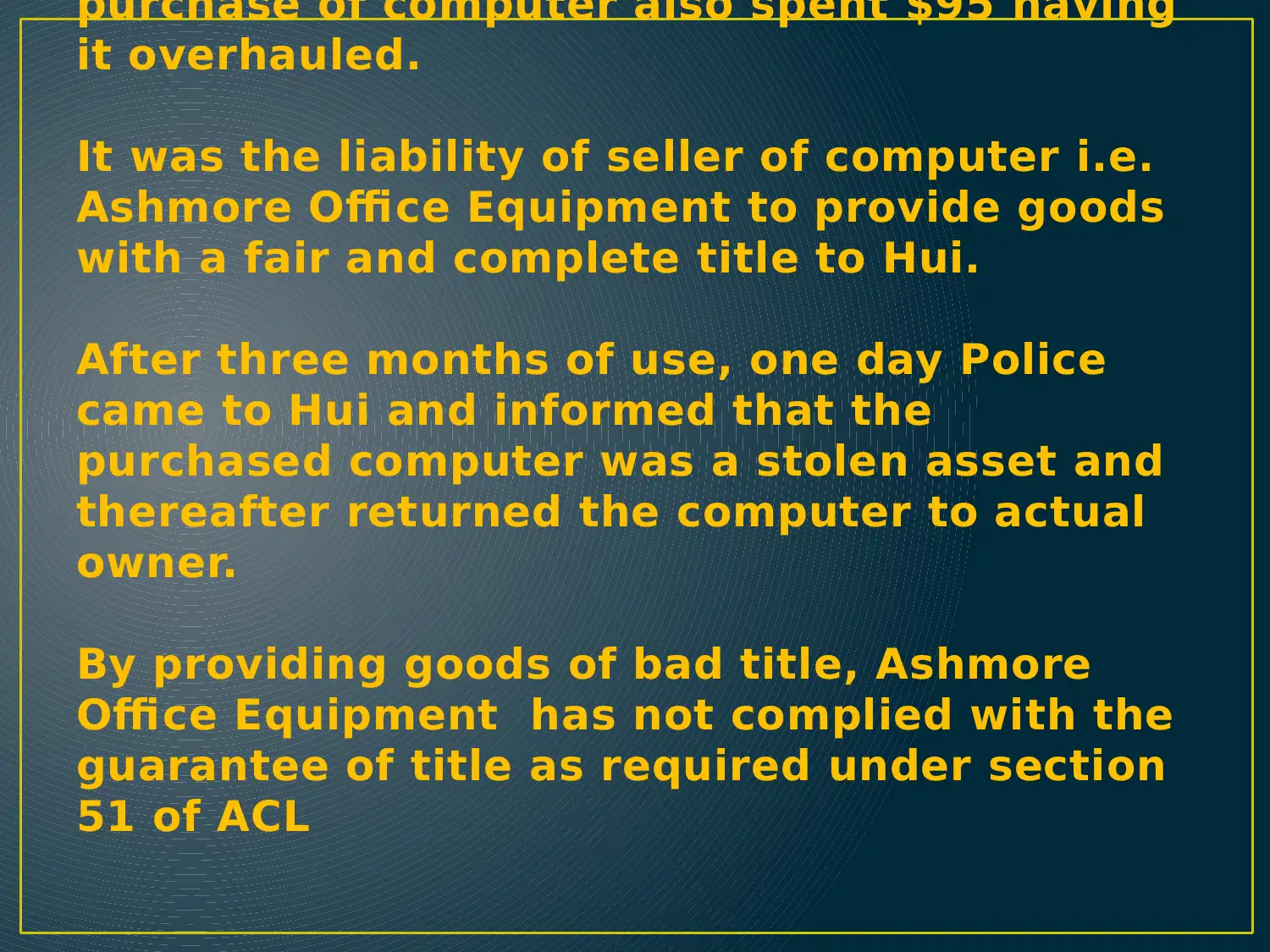
purchase of computer also spent $95 having
it overhauled.
It was the liability of seller of computer i.e.
Ashmore Office Equipment to provide goods
with a fair and complete title to Hui.
After three months of use, one day Police
came to Hui and informed that the
purchased computer was a stolen asset and
thereafter returned the computer to actual
owner.
By providing goods of bad title, Ashmore
Office Equipment has not complied with the
guarantee of title as required under section
51 of ACL
it overhauled.
It was the liability of seller of computer i.e.
Ashmore Office Equipment to provide goods
with a fair and complete title to Hui.
After three months of use, one day Police
came to Hui and informed that the
purchased computer was a stolen asset and
thereafter returned the computer to actual
owner.
By providing goods of bad title, Ashmore
Office Equipment has not complied with the
guarantee of title as required under section
51 of ACL
Paraphrase This Document
Need a fresh take? Get an instant paraphrase of this document with our AI Paraphraser
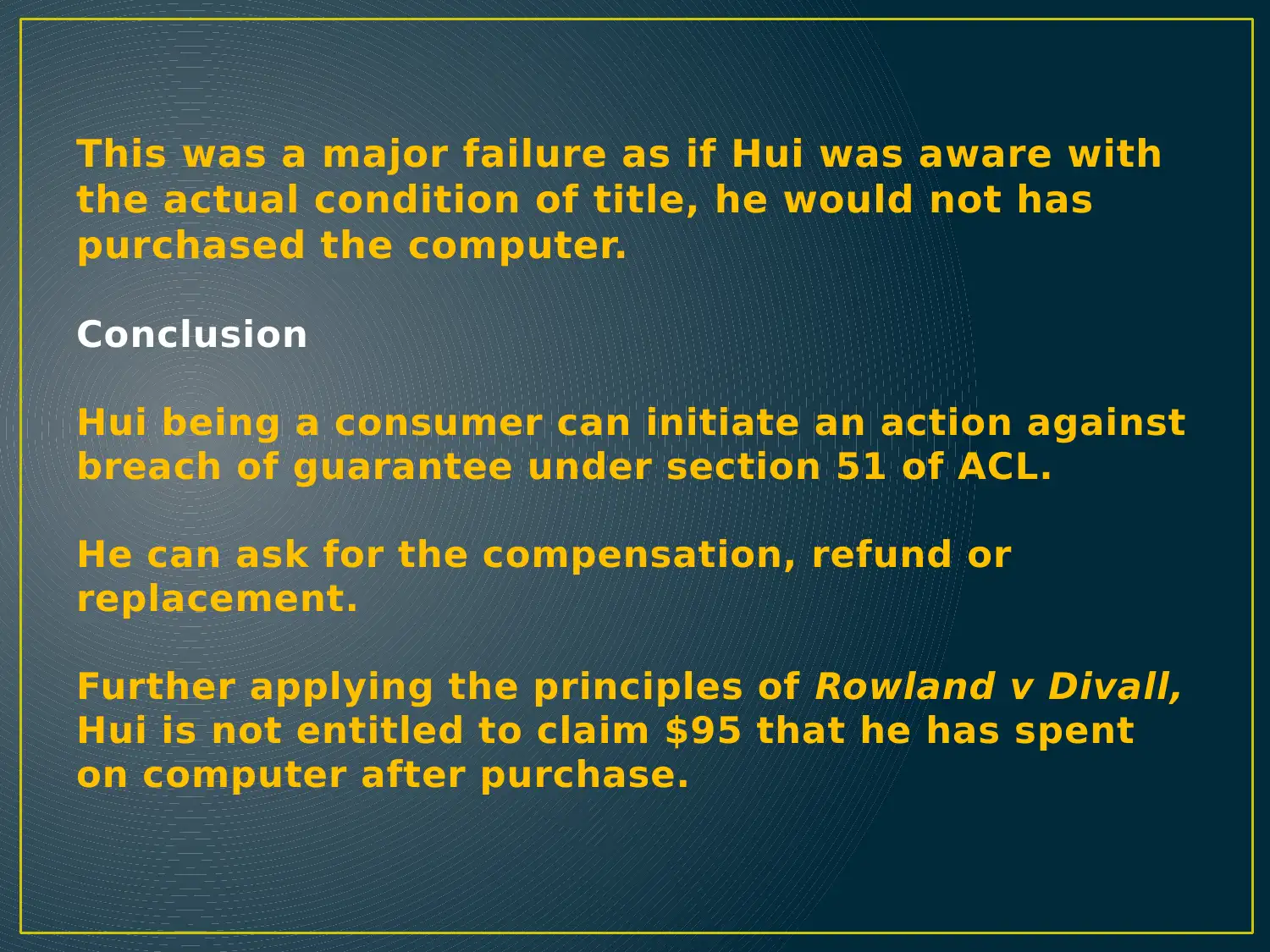
This was a major failure as if Hui was aware with
the actual condition of title, he would not has
purchased the computer.
Conclusion
Hui being a consumer can initiate an action against
breach of guarantee under section 51 of ACL.
He can ask for the compensation, refund or
replacement.
Further applying the principles of Rowland v Divall,
Hui is not entitled to claim $95 that he has spent
on computer after purchase.
the actual condition of title, he would not has
purchased the computer.
Conclusion
Hui being a consumer can initiate an action against
breach of guarantee under section 51 of ACL.
He can ask for the compensation, refund or
replacement.
Further applying the principles of Rowland v Divall,
Hui is not entitled to claim $95 that he has spent
on computer after purchase.
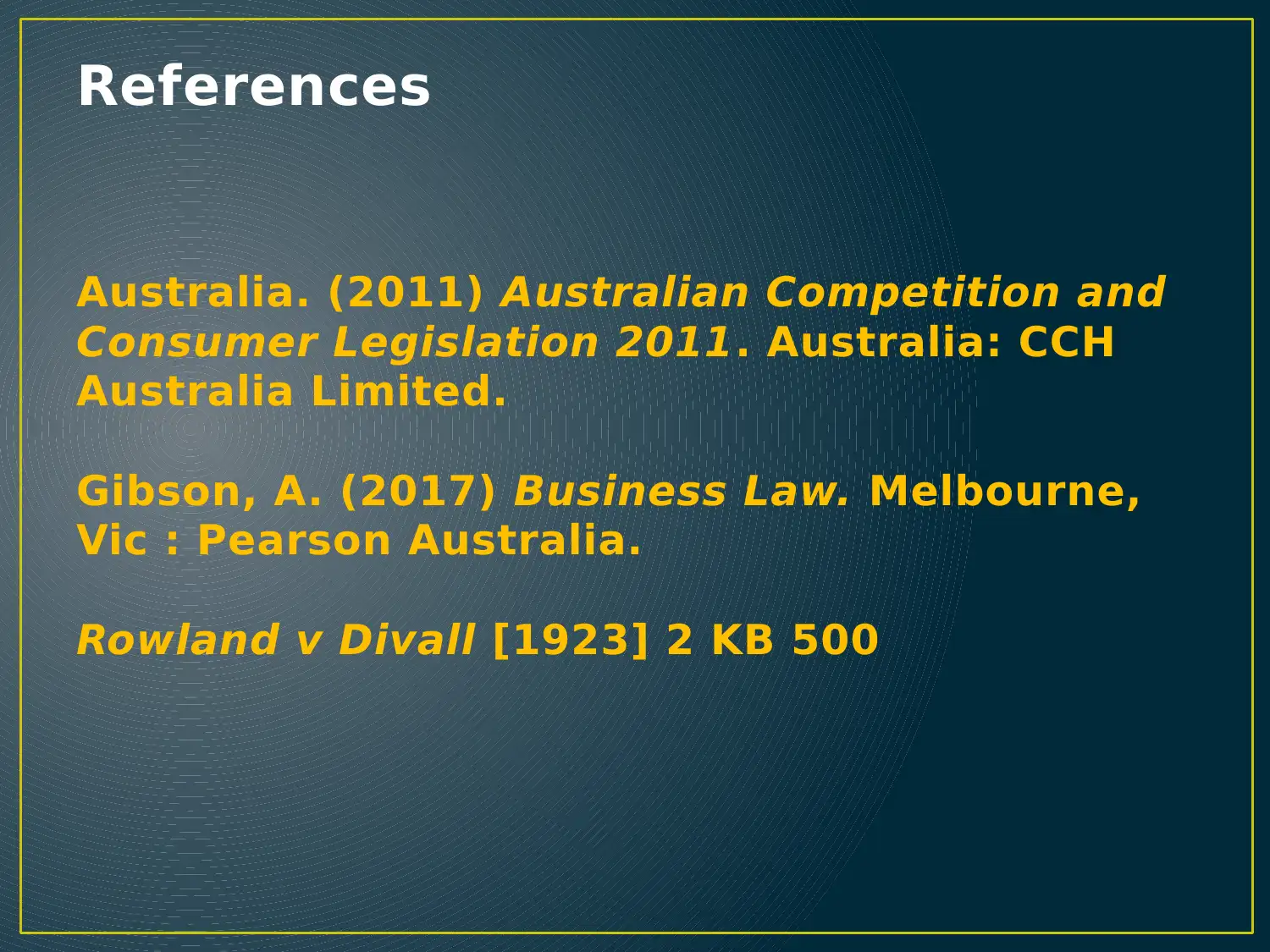
References
Australia. (2011) Australian Competition and
Consumer Legislation 2011. Australia: CCH
Australia Limited.
Gibson, A. (2017) Business Law. Melbourne,
Vic : Pearson Australia.
Rowland v Divall [1923] 2 KB 500
Australia. (2011) Australian Competition and
Consumer Legislation 2011. Australia: CCH
Australia Limited.
Gibson, A. (2017) Business Law. Melbourne,
Vic : Pearson Australia.
Rowland v Divall [1923] 2 KB 500
⊘ This is a preview!⊘
Do you want full access?
Subscribe today to unlock all pages.

Trusted by 1+ million students worldwide
1 out of 14
Related Documents
Your All-in-One AI-Powered Toolkit for Academic Success.
+13062052269
info@desklib.com
Available 24*7 on WhatsApp / Email
![[object Object]](/_next/static/media/star-bottom.7253800d.svg)
Unlock your academic potential
Copyright © 2020–2026 A2Z Services. All Rights Reserved. Developed and managed by ZUCOL.





